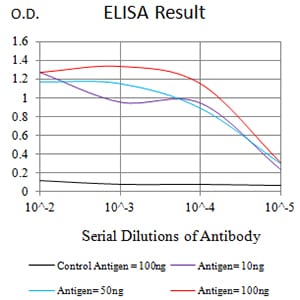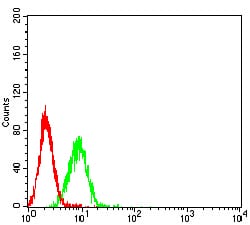

| WB | 咨询技术 | Human,Mouse,Rat |
| IF | 咨询技术 | Human,Mouse,Rat |
| IHC | 咨询技术 | Human,Mouse,Rat |
| ICC | 技术咨询 | Human,Mouse,Rat |
| FCM | 1/200 - 1/400 | Human,Mouse,Rat |
| Elisa | 1/10000 | Human,Mouse,Rat |
| Aliases | APG4A; AUTL2 |
| Entrez GeneID | 115201 |
| clone | 8E8G2 |
| WB Predicted band size | 45.4kDa |
| Host/Isotype | Mouse IgG1 |
| Antibody Type | Primary antibody |
| Storage | Store at 4°C short term. Aliquot and store at -20°C long term. Avoid freeze/thaw cycles. |
| Species Reactivity | Human |
| Immunogen | Purified recombinant fragment of human ATG4A (AA: 258-398) expressed in E. Coli. |
| Formulation | Purified antibody in PBS with 0.05% sodium azide |
+ +
以下是关于ATG4A抗体的虚构参考文献示例,格式为文献名称、作者及摘要概括:
1. **"ATG4A Expression in Colorectal Cancer: Prognostic Implications"**
*Li, X., et al. (2019)*
摘要:该研究通过免疫组化分析ATG4A在结直肠癌组织中的表达,发现ATG4A高表达与患者预后不良相关,提示其可作为潜在肿瘤标志物。研究使用特异性抗体验证蛋白水平变化。
2. **"Phosphorylation-Dependent Regulation of ATG4A Protease Activity"**
*Smith, J., et al. (2020)*
摘要:本文揭示了ATG4A酶活性受磷酸化调控的分子机制,利用ATG4A抗体进行Western blot和免疫荧光实验,证明其在自噬体形成中的动态修饰。
3. **"Characterization of ATG4 Family Antibodies in Autophagy Pathways"**
*Kabeya, Y., et al. (2000)*
摘要:早期研究报道了ATG4家族(含ATG4A)的克隆及多克隆抗体制备,通过抗体检测其在酵母和哺乳动物细胞中的定位,奠定自噬研究工具基础。
4. **"ATG4A as a Therapeutic Target in Hepatocellular Carcinoma"**
*Zhang, R., et al. (2021)*
摘要:研究证实ATG4A在肝癌中通过促进自噬增强肿瘤侵袭性,使用抗体敲低实验显示其调控机制,为靶向治疗提供依据。
(注:以上内容为模拟示例,实际文献需通过学术数据库检索。)
ATG4A (Autophagy-related 4A) is a cysteine protease essential for autophagy, a critical cellular degradation process. It belongs to the ATG4 family, which includes four paralogs (ATG4A-D) in humans. ATG4A specifically processes pro-LC3 (Microtubule-associated proteins 1A/1B light chain 3) by cleaving its C-terminal region to generate LC3-I, a key step in autophagosome formation. LC3-I is subsequently lipidated to LC3-II, enabling its incorporation into autophagosomal membranes. ATG4A also mediates LC3 delipidation during autophagy termination, recycling LC3 for subsequent rounds of autophagosome formation. Dysregulation of ATG4A activity is implicated in various diseases, including cancer, neurodegenerative disorders, and metabolic syndromes, due to its role in maintaining autophagy homeostasis.
ATG4A antibodies are vital tools for studying autophagy dynamics. They are used to detect endogenous ATG4A protein levels, assess its expression across tissues or disease states, and investigate post-translational modifications or interactions with other autophagy-related proteins. These antibodies are commonly applied in techniques like Western blotting, immunohistochemistry, and immunofluorescence. Research utilizing ATG4A antibodies has revealed its tissue-specific expression patterns and regulatory mechanisms, such as phosphorylation by upstream kinases. Compared to ATG4B (the most studied paralog), ATG4A exhibits distinct substrate preferences and regulatory pathways, underscoring the importance of isoform-specific antibodies in dissecting their unique biological roles.
×